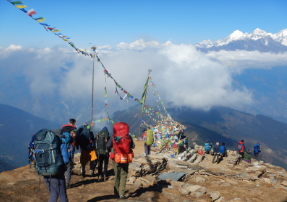By McKenna

The importance of packing light was apparent within the first few hours of our two-week trekk as I soon regretted bringing five pounds of trail mix. No matter how many times my instructors advised me to pack frugally, I needed to experience the hip bruises and aching muscles to truly understand what items were essential.
I did a mental inventory of my backpack in attempt to identify all the unnecessary items dragging me down: the set of ten colorful MUJI pens, a four hundred page Stephen King book I don’t even enjoy reading, a five dollar rain jacket that is most likely not waterproof, and two sets of extra batteries for my headlamp. As days passed and I got strong enough to help carry some extra items for my struggling group members, I realized the heaviness weighing me down the most was emotional baggage. I wasn’t able to sort through “good” and “bad” thoughts, leave the unwanted, burdensome behind and shove only helpful ideas into my backpack to bring along. The strain of spending the majority of the eight-hour hikes alone with my thoughts became too much. One day, I just sat in the middle of the trail and cried.
Trekk challenged me both physically and mentally. I cried a lot, coughed up blood, walked until my bloody blisters throbbed, lost feeling in my fingers at night, and contemplated giving up too many times to count. At the time, I didn’t understand the meaning of trekk. Of summiting a mountain just to go back down again. There are a lot of things you have to do in life that may be confusing at the time, but it is important to reflect on those experiences and always ask, “why?”.
It took me a while, but I believe the “why” of trekk was to learn a little bit more about yourself, show up for your group and help redistribute the weight when life gets to be too heavy, and forge deeper connections with the sacred Himalayas. Humbled by the immensity and beauty of Nepal, during trekk we came together as a family and made life a little lighter for one another.
When returning from Nepal, the most strikingly obvious difference was my physical surroundings. Nepal was lively and colorful; I would spend ten-hour bus rides mesmerized by the views. The vibrant cities gave way to lush hills which turned into the breathtaking Himalayas, whereas December in New Jersey was gloomier than I remembered and everything seemed to be washed over with a pale, cold grayness.
I missed the noises, too. I missed turning off my futile 7 A.M. alarm after waking to the sound of scrappy stray dogs and the monastery bells. I missed the shopkeepers shouting across the street to one another over the background of Nepali moped horns. I missed the extensive bargaining that preluded each and every purchase. I missed debating with my friends how to best spend our two dollars at the grocery store. The jarring silence of the suburbs was eerie.
In an attempt to assimilate back to life at home, I offered to run errands for my mom. Upon walking into ShopRite, I was immediately overwhelmed with the surplus of food. My eyes darted all over the store, trying to absorb everything at once. In Nepal, fresh daal bhat is a daily ritual eaten for lunch and dinner. Now, there was too much going on. Too many options. I walked down each aisle slowly, so that I could focus on small sections at a time.
An hour later, I realized my cart still only contained ten items. I looked around at the carts filled with mounds of food and thought about how Nepal grocery stores didn’t have shopping carts, nor was there a need for them. As I paid, the cashier made a comment about my refusal to put my produce items in individualized plastic bags. And for the first time in my life, I thought about where my trash ends up. Once I bring the bins to the end of my driveway every Tuesday night, I never think about where it all disappears to. In Nepal, I didn’t have to wonder. When the trash piles would grow too high, they were set on fire to free up space. Acrid smoke from burning plastic fille dour nostrils, quite literally forcing us to choke on our own trash.
I rushed to my car and cried in the parking lot. I cried because no one in the grocery store had talked to me besides the cashier. I cried because I missed all of the honking annoyed motorcyclists, inviting street vendors, and human interaction involved when making a trip to the local ten by twenty grocery store in Nepal. I cried because I was dumbfounded as to why I wanted strangers at the grocery store to smile at me, something I probably would’ve considered creepy in the past. I cried because I knew my homestay family, living in a small village in the outskirts of our consumer-driven society, was more influenced by climate change than anyone at the store. I cried because I felt misplaced and lost in a town that I had lived in my entire life. I cried because I was confused about who I was. I cried because I knew a piece of myself was still in, and always will be, Nepal.







